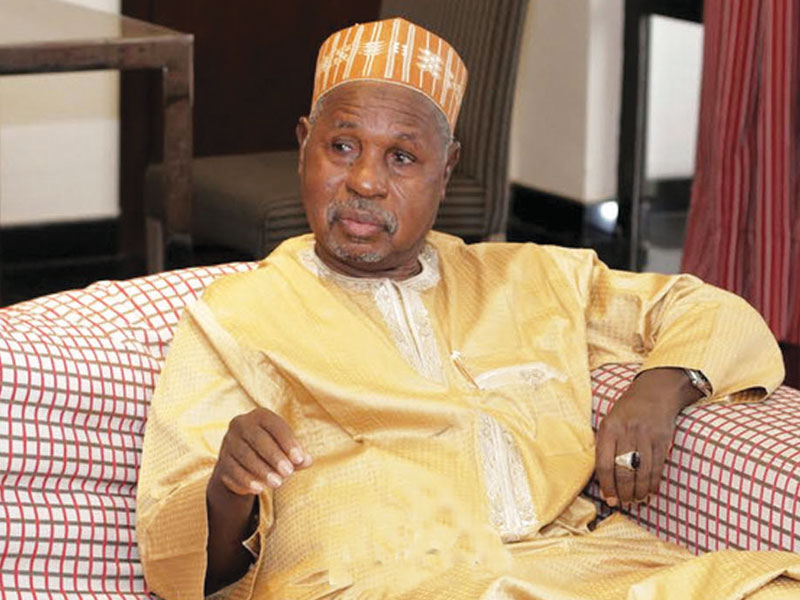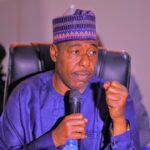Governor Aminu Bello Masari of Katsina State was the Speaker of the House of Representatives between 2003 and 2007. Masari, who is serving his second term as governor, in this interview with State House Correspondents, said he will retire from active politics when his tenure ends in 2023. He also spoke of his plans to empower women and youths in the state.
You presented a budget of N249 billion for the 2020 fiscal year and promised to make the state attain economic growth. How do you intend to achieve these?
Well, first of all, if you look at the breakdown of the budget, you’ll see that only 30% is going for current expenditure, about 69.7% is going for capital investment. If you are investing in capital, it means you are creating opportunities and all opportunities need some form of business activity. We are also developing hectares of land and we have started developing that by providing infrastructure for investors to key into in the area of agriculture.
Also, we have the go-ahead from the Ministry of Agriculture to do commercial agriculture and going into this, we are working with the Central Bank on the areas we have comparative advantage. There was a time Katsina was producing 60% of the cotton in Nigeria. So, we are working to reinvent that and this has to do with going back to history to bring back our cotton production.
The Anchor Borrower cotton programme was launched here. If we develop agriculture, we are repositioning the economy of the state. We also look forward to investment in the production of qualitative grass. And luckily enough, we have indigenes who are doing a lot in the areas of rice processing and fertiliser. We are doing so many things in order to encourage others to invest in commercial agriculture.
You mentioned that youth empowerment was one of your major objectives. Has your programme been able to reduce youth restiveness in the state?
We upgraded the craft village and expanded our intake. We identified every trade within three to six months, and gave startups. Through this, we produced thousands of skilled mobile youth businesses. Also, we worked with the DFID programme to rehabilitate about eight vocational training centres across the state. We were in a discussion with them last week and so far, they have produced over 4,000 trainees, and we have what are called business promotion centres and about 150 participants.
How many people are you envisaging to impact with agricultural empowerment? What effect will it have on the economy come 2020?
This programme of getting over 100 million people out of poverty was cascaded down the state and we are doing our part on how much we intend to spend on each person. For example, if we train over 10,000 the previous year, we expect to double the number this year. We have a similar programme under the Ministry of Women Affairs and Youths and so many ministries and departments.
In order to enhance the training, we upgraded the Ministry of Science and Technology because we are trying to catch as many people as we can. Alongside that, we are also working with the local government areas to deal with issues of insecurity and we have a special programme on that.
With the talk to end the Almajiri system of education, what is your focus on addressing the issue of out of school children?

The most important thing is that we are working towards seeing how we can upgrade the dichotomy in the school system because some of these children rarely attend informal Qur’anic schools. Hopefully, UBEC and the federal government will join us to normalise issues in this regard so that those in Qur’anic and Islamiyya schools will have some elements of Western education and craftsmanship. This is to ensure that at the end of their training, they would have learnt something and one day join the mainstream education system.
Definitely, we have to think out of the box to come up with programmes that will see to that because up till now, in some rural communities, there is a bit of fear and perception which is as a result of the collapse of basic and quality education. Some parents would say they enrolled their child in school but he or she has not learnt anything.
We are working so that at the end of junior or senior secondary education, most of these children will be able to put to use what they learnt. We are on a complete circle of looking into the problem and how we go about proffering solutions. This is possible and it can be achieved though it requires a lot of determination.
Some issues about education should be off partisan politics. As Nigerians, we should come out in numbers to support growth in the education sector so that we will be able to put our people at work because only education can help you to act in such a manner.
Two years ago in Batagarawa, you set up a master edifice of the science and technical school transformation. Come 2020 what other plans do you have in the area of education?
If you look at our capital budget, our priority is to spend 20 percent on education. This means the work we started on education in terms of renovation, upgrading and provision of equipment to schools is what we intend to continue with in Katsina State in the next 20 years. That will place the state in the right place to compete favourably not only in Nigeria but internationally. We are talking about public education and 30 percent of the population is privileged as they depend on public institutions.
You recently called on state governors to disarm repentant bandits. What informed your decision, and would you say the amnesty programme is effective?
For us, we can say the peace we negotiated with the bandits is working and since we started this, we have not had attacks that we used to have. Communities are no longer being invaded, killing and raping have stopped. We have not attained total victory because criminal elements among them are still perpetrating these acts.
So, we are still battling with it and are calling on them to put an end to it because we will not hesitate to deal decisively with any offender.
We have the capacity to deal with the situation but do not want a blanket approach in order to address the issues that affect us as a people. Surrendering of arms is in phases. We are working on peace. Hopefully, we will succeed in bringing total calm to the state. Some people, we were told, are holding on to the weapons to protect themselves, while the bandits are holding them to attack. But if there is normalcy, every weapon in the hands of herders will be brought in – when they are confident there won’t be attacks against them.
But of course, bandits have to be disarmed by force and we have started receiving some of these weapons from repentant herders and bandits. It is a continuous progress on both sides as we are looking at restoring normalcy which makes possession of any form of arms and ammunition useless.
You tried this method during your first tenure but the bandits returned. How will you ensure it does not happen again?
In 2017 and 2018, it was simply because there was no similar programme in Zamfara, Kaduna and in the totality of the forest area in Katsina. So, the bandits, herders in terms of population are more in Zamfara, Kaduna. And when we are experiencing peace here, they don’t have peace there.
Most of the leaders we had peace talks with were eventually killed by bandits from Zamfara in particular, and it is safe to say Zamfara is where most bandits live, and in Kaduna because of the forest areas. But now, Zamfara is running same amnesty programme alongside Sokoto and even in Kaduna to some extent and this will be successful as long as we engage our neighbours in the peace negotiation with bandits. But if that is neglected, then we will be back to square one. The peace we have will last for a much longer period with participation from various states.
You have been able to silence the opposition party in the state and sometime ago, it was reported by a newspaper that you are among governors behind the success of President Muhammadu Buhari. Why are you secretive about these?
Governance is like politics. Some matters are on the table while others are under the table. There is politics of campaign normally in the daytime but then, we have politics of meeting people, talking to them and making them understand. That was why the people come out here en masse. Besides, I am not the only one talking to people behind closed doors, most politicians do same and it is not out of place. The president is from Katsina State, so we have greater responsibility to ensure the world knows that not only about the All Progressives Congress or the PDP but also Katsina State are solidly behind the president.
You are a one-time number four citizen in the country and now a two-time governor. After this, what will be your next political ambition?
I will retire. By the time I leave office, I will be 73 years and at that age, I will need to rest.
What about politics?
I will continue at the background.

 Join Daily Trust WhatsApp Community For Quick Access To News and Happenings Around You.
Join Daily Trust WhatsApp Community For Quick Access To News and Happenings Around You.



